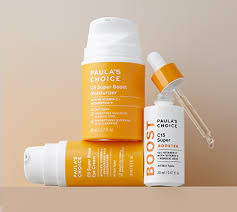
Vitamin C Ascorbic Acid in Skin Care
Vitamin C is one of the best ingredients in skin care products because it has many skin benefits. However, it can be very expensive so you need to make sure that Vitamin C is the best skin care ingredient for your skin type.
In this blog I will tell you which Vitamin C products dermatologists recommend and why. You will also learn how to know if you need Vitamin C for your skin type.
There are many Vitamin C products out there are not made properly and do not work.
When should you start using Vitamin C on your skin?
When to use Vitamin C on your skin depends upon which Baumann Skin Type you are.
Take the Quiz
Side Effects of Topical Vitamin C
The good vitamin C serums are acidic. They can cause:
stinging
skin burn
rash
acne
Vitamin C does not cause skin dryness. Some formulations such as SkinCeuticals C E Ferulic can make skin feel oily.
Vitamin C does not cause photosensitivity.
Skin Types and Vitamin C
Which skin type should use Vitamin C?
These skin types will benefit from vitamin C:
Aging skin
Dull skin
Mature skin
Uneven Skin tone
Which skin types should not use Vitamin C?
Rosacea types and stinging skin types should not use Vitamin C serums.
The most effective Vitamin C skin care products are a low ph.
These acidic serums:
Exfoliate
Irritate Skin
Cause facial flushing
Cause stinging
Rosacea types and people with stinging skin can use vitamin C creams instead of serums but these are not very effective.
Vitamin C creams are not as effective as serums because the pH is not as low. They do not absorb well into the skin.
There are better antiaging ingredients than ascorbic acid for people with rosacea and stinging skin.
The best way to know if you should use Vitamin C is to shop by your Baumann Skin Type.
Take the Quiz
Vitamin C and Sensitive skin
Is Vitamin C good for sensitive skin?
Vitamin C is not a good choice for sensitive skin types.
Vitamin C must be acidic to be effective so it can irritate sensitive skin types.
Although it is an antioxidant, it can cause inflammation in sensitive skin such as rosacea-prone skin types.
Never use Vitamin C on irritated skin or skin with a rash.
What does Vitamin C irritation look like?
Skin that has a rash from Vitamin C may be:
red or pink
itchy
stinging
rough to touch
tender and uncomfortable
slightly warm to touch
Is Vitamin C too harsh for sensitive skin?
Vitamin C is too harsh for sensitive skin because the good serums are a low acidic pH.
Vitamin C serums can make these types of sensitive skin worse:
acne
rosacea
stinging skin
Can Vitamin C cause an allergic reaction on the face?
It is unusual to have a true skin allergy to topical ascorbic acid.
It is more likely that your skin is irritated by the low acidic pH of the Vitamin C serum.
What to do if my skin is sensitive to Vitamin C?
Don’t use Vitamin C if it irritates your skin. Inflammation can lead to skin aging and hyperpigmentation.
You can take oral Vitamin C supplements and get skin benefits without upsetting your sensitive skin.
(Note that oral Vitamin C does not raise skin levels of Vitamin C as much as applying it topically, but it is a good option when ascorbic acid serums irritate your skin or make it break out.)
How to treat vitamin C skin irritation?
If Vitamin C burned your face, you need to take special care of your skin to prevent post inflammatory hyperpigmentation.
Here are steps to take if your skin is irritated from Vitamin C serum:
Cleanse with a soothing cleanser
Apply a moisturizer with soothing ingredients.
Avoid hydroxyacids (AHAs)
Avoid beta hydroxyacids (BHA)
Avoid retinoids
Stop using the Vitamin C serum
Stay out of the sun
undefined
Vitamin C in A Skincare Routine
How to combine Vitamin C and retinol in a skin care routine?
Vitamin C goes first. It can be used in am and pm. Retinol should be applied after Vitamin C.
Whether the retinol goes before or after a moisturizer depends upon your Baumann Skin Type.
Once you take the quiz we will tell you the best product order for vitamin c and retinol for your skin type.
When should you use Vitamin C in routine?
Vitamin C always is the 3rd step in your skin care routine.
This is the order to apply Vitamin C serum in your routine:
Cleanse skin
Apply protective eye cream
Apply vitamin C serum
Moisturizer
What not to mix with Vitamin C in skincare?
Always apply Vitamin C serum alone to clean skin because it does not mix well with many other ingredients.
You can wait for the Vitamin C to absorb and then apply other serums.
Can I use Vitamin C serums with other serums?
You can use other serums after Vitamin C but do not mix them with the Vitamin C before applying.
Serums that can follow Vitamin C are:
retinol
hyaluronic acid
niacinamide
heparan sulfate
defensins
growth factors
exosomes
How to Use Vitamin C
Always apply vitamin C to clean skin preferably after cleansing with a low pH cleanser.
How much serum to apply?
Apply 1/8th of teaspoon for entire face.
Do I use Vitamin C Serum Day or Night or Both?
You can use Vitamin C serum morning and night but it really depends upon your Baumann Skin Type.
Take the Quiz
Vitamin C before or after moisturizer?
Always use Vitamin C before a moisturizer. Using it after a moisturizer is a waste of money because it will not absorb.
How often should I use Vitamin C in skin care?
Not all skin types should use Vitamin C. Some Baumann Skin Types should use it once a day and some 2 times a day.
Can I use Vitamin C serum every day?
Most skin types can use Vitamin C every day and even twice a day.
However, not all sensitive skin types can tolerate Vitamin C.
Know your Baumann Skin type before buying any Vitain C products.
Take the Quiz
undefined
Using Vitamin C with other Cosmeceutical Ingredients
Vitamin C and Retinol Together
How to know if I need retinol or Vitamin c?
This is easy! Take the skin type quiz and we will tell you exactly which products you should use and the correct skin care routine order.
Take the Quiz
What goes first- Vitamin C or retinol?
Vitamin C always goes before retinol.
Retinol absorbs easily.
Vitamin C does not.
How to layer Vitamin C and retinol?
Cleanse skin
Apply protective eye cream
Apply vitamin C serum
Moisturizer
Retinol
However if you are used to your retinol and not having side effects, use the retinol in step 4 and moisturizer last on top of the retinol.
How long should I wait between Vitamin C and retinol
Learn more about using retinol, hyaluronic acid and Vitamin C in the same skin care routine here.
When should you not use Vitamin C on your face?
Do not use Vitamin C on your face if you have:
redness
flushing
Stinging
a rash
retinoid dermatitis
blisters
a peeling sunburn
However, you can use Vitamin C on sunburned skin if it has not blistered or peeled.
When should I use Vitamin C on my face?
The morning is the best time to use Vitamin C serum because it can protect you from sun exposure and pollution.
However, you can also use it at night so skin has the ascorbic acid it needs to generate new collagen.
undefined
What are the best Vitamin C products?
The best Vitamin C serums are made by SkinCeuticals, La Roche Posay and Derma Made.
The best Vitamin C skin care products are:
a pH of 2-3
made from L-ascorbic acid
serums not creams
in a amber bottle or airless pump
NOT in a jar
made by reputable brands
freshly opened
You can read more here about the best ascorbic acid serums.
Find the best Vitamin C for melasma here.
These are some of our favorite Vitamin C serums:
La Roche-Posay Vitamin C Serum
$44.99
Out of Stock
Obagi-C FX System C-Clarifying Serum
$140.00
Add to Cart
Obagi Force Field Kit with Professional-C Serum 20%
$189.00
Out of Stock
Obagi Professional-C Peptide Complex
$125.00
Add to Cart
CeraVe Skin Renewing Vitamin C Serum
$26.99
Out of Stock
ISDIN Flavo-C
$100.00
Add to Cart
ISDIN Flavo-C Ultraglican Ampules
$46.00
Out of Stock
ISDIN Hyaluronic Booster 10 Ampoules
$46.00
Add to Cart
ISDIN Melatonik® Restorative Melatonin Night Serum
$160.00
Add to Cart
La Roche-Posay Pure Vitamin C Face Cream
$54.99
Add to Cart
La Roche-Posay Vitamin C Serum
$44.99
Out of Stock
Obagi-C FX System C-Clarifying Serum
$140.00
Add to Cart
Obagi Force Field Kit with Professional-C Serum 20%
$189.00
Out of Stock
Obagi Professional-C Peptide Complex
$125.00
Add to Cart
CeraVe Skin Renewing Vitamin C Serum
$26.99
Out of Stock
ISDIN Flavo-C
$100.00
Add to Cart
ISDIN Flavo-C Ultraglican Ampules
$46.00
Out of Stock
ISDIN Hyaluronic Booster 10 Ampoules
$46.00
Add to Cart
ISDIN Melatonik® Restorative Melatonin Night Serum
$160.00
Add to Cart
La Roche-Posay Pure Vitamin C Face Cream
$54.99
Add to Cart
La Roche-Posay Vitamin C Serum
$44.99
Out of Stock
Obagi-C FX System C-Clarifying Serum
$140.00
Add to Cart
Obagi Force Field Kit with Professional-C Serum 20%
$189.00
Out of Stock
Obagi Professional-C Peptide Complex
$125.00
Add to Cart
CeraVe Skin Renewing Vitamin C Serum
$26.99
Out of Stock
ISDIN Flavo-C
$100.00
Add to Cart
ISDIN Flavo-C Ultraglican Ampules
$46.00
Out of Stock
ISDIN Hyaluronic Booster 10 Ampoules
$46.00
Add to Cart
ISDIN Melatonik® Restorative Melatonin Night Serum
$160.00
Add to Cart
La Roche-Posay Pure Vitamin C Face Cream
$54.99
Add to Cart
What are the 8 different types of Vitamin C in skin care products?
aminopropyl ascorbyl phosphate
ascorbyl glucoside
ascorbyl palmitate
ethyl ascorbic acid
L-ascorbic acid
magnesium ascorbyl phosphate
sodium ascorbyl phosphate
tetrahexyldecyl ascorbate
Comparison of Vitamin C forms in skin care products:
This table compares the stability, absorption and formulations of Vitamin C.
Note which are fat soluble and which are water soluble.
Fat soluble forms protect the cell membrane while water soluble works inside the cells.
All forms of Vitamin C have some effects on blocking melanin production and increasing collagen.
However, it is the form ascorbic acid that is the most effective form. The other forms must convert into ascorbic acid to be effective.
undefined
The most effective Vitamin C must be:
stable
absorbed
able to convert well ascorbic acid.
L-ascorbic acid is the most potent form- if it is formulated at a pH of 2-3 so it is absorbed.
Your skin care routine should be designed to increase absorption and stability of the ascorbic acid.
We will design a skin care routine for you based on your Baumann Skin Type.
If Vitamin C is right for you, the regimen will be designed to maximize absorption of Vitamin C.
Take the Quiz
How Long does it take?
How long does it take Vitamin C to absorb into the skin?
It depends upon the pH and what other ingredients are on the skin.
Learn more here.
How Long Does it take Vitamin C to work?
Vitamin C can take months to work. How long depends upon:
What you are treating
What your Baumann Skin Type is
Which Vitamin C product
How you use it
How often you use it
When you apply it i
What other products you use it with
Learn more about how long it takes to treat dark spots and wrinkles, click here.
Best Vitamin C creams to moisturize
Vitamin C creams are not very good because
To high of a pH to absorb
Not good barrier repair moisturizers
Not enough moisturizing of fatty acids
Instead, choose a moisturizer that is right for your Baumann Skin Type.
Take the Quiz
What is Vitamin C cream used for?
These are used to treat dark spots and wrinkles. However, Vitamin C serums work better than Vitamin C creams.
Best products with Vitamin C and retinol
I prefer that my patients use separate Vitamin C and retinol serums instead of using a combination product.
Vitamin C in Dermatology
Can Vitamin C help with skin issues?
Yes. These are the skin issues that Vitamin C can help:
aging skin
dark spots
melasma
stretch marks
thin skin
radiation dermatitis
wrinkles
Does Vitamin C fade dark spots?
Yes Vitamin C is a tyrosinase inhibitor. But it is not as strong as other skin lightening ingredients to lighten dark spots.
Stop wasting time and money on the wrong products, shop by your Baumann Skin Type.


